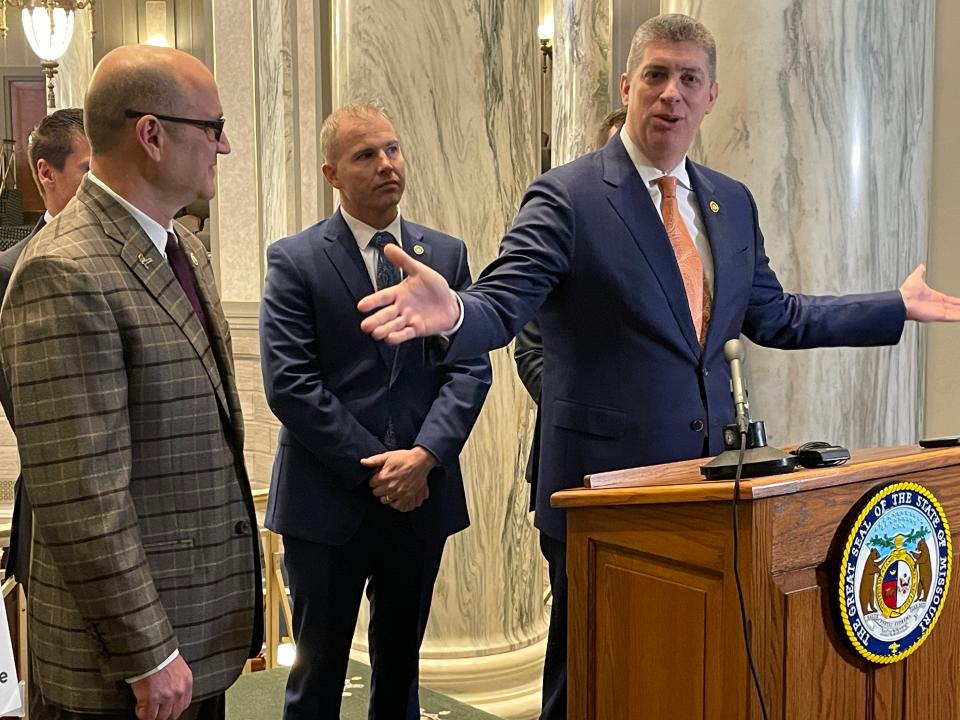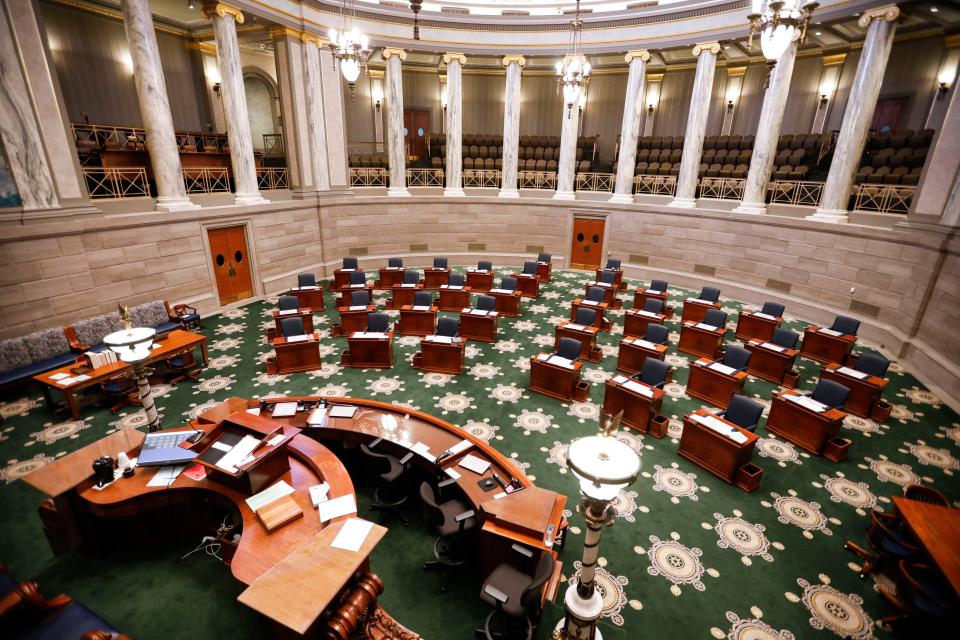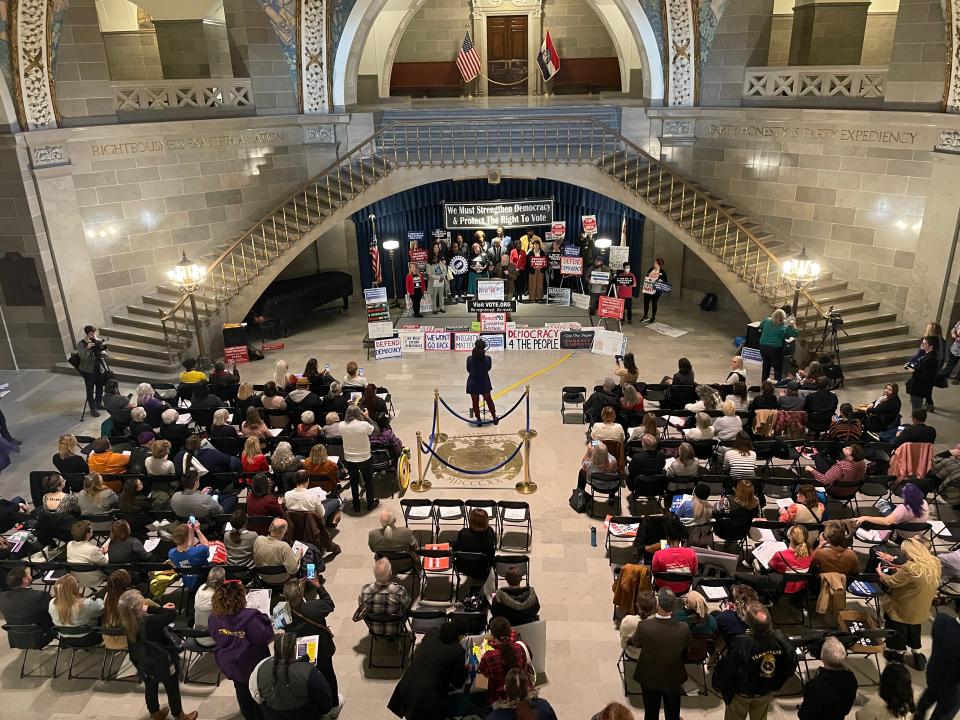Initiative petitions are the topic of much debate in Missouri’s legislature. Here's why
Initiative petitions, which Missouri voters have used to legalize medicinal and recreational marijuana, expand Medicaid benefits and defeat so-called right-to-work laws, are the focus of much legislative attention.
In the first month of the 2024 legislative session, this topic has dominated the discussion in the Missouri Senate, while being heard by committees in the House.
The Senate seems poised to take up the debate this week, with threats of continued Republican infighting if the topic is not addressed.
Missouri Freedom Caucus members, a group of hardline Republicans in the state legislature, have made initiative petitions a major legislative priority this session. The Senate was at an impasse last month due to filibusters from these lawmakers, who sought immediate action on the issue.

These tactics led to Senate President Pro Tem Caleb Rowden removing four Freedom Caucus members — state Sens. Bill Eigel, Rick Brattin, Denny Hoskins and Andrew Koeing — from their committee chairmanships and revoking their privileged parking spots. There was also discussion of confiscating their office furniture, but that never came to fruition.
The gridlock finally broke last week after an overnight filibuster, as legislation overhauling the initiative petition process was advanced through a Senate committee. Similar legislation has also been progressing in House committees.
How do lawmakers hope to change the initiative petition process?
At least 20 bills were filed in the House and the Senate aimed at altering the initiative petition process in 2024. Twelve of those were heard by a Senate committee last week. That legislation was rolled into one omnibus bill and passed, and is currently awaiting debate in the Senate.
Currently, an initiative petition must receive a simple majority, or at least 50% plus one vote in order to pass. In past elections, recreational marijuana passed with 53.1% of the vote in 2022, Medicaid expansion passed with 53.3% of voters in favor in 2020 and medical marijuana passed with 65.5% of the vote in 2018.
Instead of just a simple majority, some lawmakers have proposed using a concurrent majority system, which would require a majority of the statewide vote and a majority of either congressional districts, state Senate districts or state House districts.
This would increase the support necessary in rural areas in order to pass constitutional amendments through initiative petitions, a key point in the arguments from many of these lawmakers.
Missouri Mapper on X, an account from an amateur psephologist who tracks voting patterns across the state, looked at what it would take to pass recreational marijuana under these concurrent majority standards, according to the 2022 vote.
Using a concurrent majority with Missouri House districts, it would have passed with 99 out of 163 districts in favor. Using Missouri Senate districts, the measure also would have passed with 20 out of 34 districts in favor. However, under a concurrent majority with congressional districts, it would have failed, with only four out of eight in favor of passing the measure.

The legislation soon to be considered by the Missouri Senate proposes using Missouri House districts as the method for deciding a concurrent majority, meaning that initiative petitions must pass with a simple majority of statewide voters and 82 of 163 state House districts in favor. This is the official position of the Missouri Freedom Caucus.
At a Senate hearing last week, state Sen. Sandy Crawford, R-Buffalo, raised concerns about using House districts as the deciding factor for concurrent majorities, based on their irregular sizes and populations.
“I personally have issue with the House districts because they're not the same size,” Crawford said. “Congressional districts are, with the exception of one person.”
In public testimony, Elizabeth Franklin, a citizen living in rural Missouri, testified in opposition of changing the initiative petition process.
“I do represent rural Missouri,” Franklin said. “I have acreage and the requirement to have a constitutional amendment passed both by statewide majority and also a majority of whether its congressional, state Senate, state representative districts will very likely create a rule by minority undermining the will of all Missourians."
Other debates at this committee hearing centered around what many lawmakers have dubbed “ballot candy,” which refers to the practice of putting enticing language at the top of the ballot language in order to get voters to approve a measure, while placing the real meat of the issue further down in the list of changes that a ballot initiative would enact.
For these particular bills, several included language stating that only a citizen and Missouri resident could vote. This is already the law in Missouri, but debate ensued over the wording of the current statute that says “all citizens” may vote, rather than “only citizens.”
Only one bill related to initiative petitions has passed in a House committee. Legislation by Rep. Mike Haffner, R-Pleasant Hill, would prohibit practices that pay signature-gatherers per signature collected and invalidate signatures collected under ballot summary language that is later changed by the court.
More: Ballot initiative process sure to be in GOP's crosshairs during legislature's 2024 session
Why is there all this fuss about initiative petitions?
Changing the initiative petition process has been a goal for Republican lawmakers in past sessions, but a new variable is spurring the desire for quick action.
Two competing ballot initiatives seeking to once again legalize abortion in the state are vying for a spot on the 2024 ballot. With a tight deadline, the campaigns must each collect more than 171,000 valid signatures by May 5 in order to be included on either the August or November ballots.
While the proposals vary greatly in the details, both would allow abortion in some form to occur in Missouri. During Gov. Mike Parson’s most recent State of the State address, he touted a statewide win in the fact that zero abortions were conducted in Missouri in 2023.
Missouri was the first state to trigger a near-total abortion ban in 2022 when Roe v. Wade was overturned by the U.S. Supreme Court. Abortions are only allowed in extreme cases to save the life of the mother, but doctors are still hesitant to perform abortions due to the strict legal liability associated with doing so in the state.
Following the launch of the campaign to restore abortion rights with the least restrictions, members of the Freedom Caucus engaged in a filibuster to force Senate leaders to bring the initiative petition legislation to a floor debate, citing the abortion measure as a cause for immediate action.

House Minority Leader Crystal Quade, who is running for governor and has also filed legislation to reinstate abortion rights, said she is glad that Republicans are publicly voicing the link between abortion and initiative petition changes, which was assumed by many as the cause behind the efforts.
“I'm glad that they're finally saying the quiet part out loud,” Quade said.
However, if you ask the sponsors of the legislation why they are trying to change the initiative petition process, they say it is the give rural residents a larger voice in the issues that make it to the ballot.
These lawmakers say that their constituents have been vehemently opposed to past ballot measures, but feel like their voices are being drowned out by more populous urban areas that want to see the measures pass.
“They're saying that their voice is being drowned out by the more populated areas,” said state Sen. Jill Carter, a member of the Freedom Caucus. “And so what do you do for them to make them feel like they have an equal voice?”
Denise Lieberman, director and general counsel at the Missouri Voter Protection Coalition, counters that assertion with a simple statement — one person, one vote. She feels that any system that raises the standards to pass an initiative petition from a simple majority of 50% plus one in favor of a measure is creating an uneven playing field.
“When we undertake a concurrent majority process like have been proposed in all these bills, whether it's congressional districts, Senate districts or House districts, it actually gives folks in those rural communities and their votes greater weight than others,” Lieberman said. “That's something that is antithetical to our constitution’s promise of one person, one vote.”

Last week, opposing rallies at the Missouri State Capitol Building showed the split between these factions in the state. One group, organized by Progress MO, a progressive advocacy group, met to oppose changes to the initiative petition process.
Just one floor above them, the Missouri Freedom Caucus hosted a rally in support of their efforts to advance legislation changing the initiative petition process. Some who came to the Capitol that day almost comically found themselves at the wrong rallies, voicing some confusion about the messaging before being directed to their respective groups of like-minded folks.
This article originally appeared on Springfield News-Leader: What's all the fuss about initiative petitions in the Missouri Senate?

